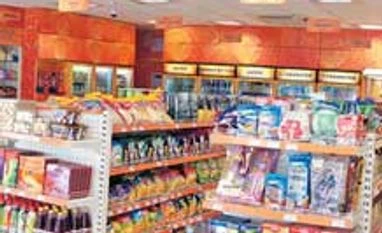Analysts say the raw material cost index is up across the board. The commodities that saw a month-on-month fall in prices include: tea, safflower oil, mentha oil and sugar. The fall in prices is marginal compared to the sharp rise in other commodities. As a result, the downward pressure on margins would be greater. Over the past two months, global food prices have risen, thanks to droughts in Brazil and dry weather conditions in southeast Asia, which will continue to put pressure on commodity prices in the coming months.

Despite the increase in costs, pricing has remained stable during the fourth quarter. Slow growth and dipping volumes have prevented companies from increasing prices in the March quarter. In the first two quarters of FY14, FMCG companies reported margin expansion, but this was largely driven by falling raw material costs. If raw material prices continue to inch up and companies are unable to pass on the cost push, margins will start declining again. In the first quarter, Hindustan Unilever's gross margins expanded 160 basis points to 48.9 per cent and operating margin rose 80 basis points to 15.9 per cent, compared to the corresponding period in the previous year, but analysts stayed bearish on the stock as underlying volume growth was four per cent.
The FMCG industry's volume growth isn't coming back in a hurry, analysts believe. UBS Global Research expects volume growth to rebound from the current level of 0.5 per cent to five-six per cent over the next one to two years, given the year-on-year volume growth of six-seven per cent recorded over the 2004-08 period. However, with rural demand cooling, double-digit volume growth is unlikely in the near future. Not only have FMCG stocks underperformed the BSE Sensex by 8.4 per cent since the middle of 2013, but the sector has also seen earnings estimates for FY15 have declined by an average of five per cent. The decline in earnings estimates for ITC and HUL are better than that of the sector. Overall, FY15 is expected to be another lukewarm year for consumer companies.
You’ve reached your limit of {{free_limit}} free articles this month.
Subscribe now for unlimited access.
Already subscribed? Log in
Subscribe to read the full story →

Smart Quarterly
₹900
3 Months
₹300/Month
Smart Essential
₹2,700
1 Year
₹225/Month
Super Saver
₹3,900
2 Years
₹162/Month
Renews automatically, cancel anytime
Here’s what’s included in our digital subscription plans
Access to Exclusive Premium Stories
Over 30 subscriber-only stories daily, handpicked by our editors


Complimentary Access to The New York Times
News, Games, Cooking, Audio, Wirecutter & The Athletic
Business Standard Epaper
Digital replica of our daily newspaper — with options to read, save, and share


Curated Newsletters
Insights on markets, finance, politics, tech, and more delivered to your inbox
Market Analysis & Investment Insights
In-depth market analysis & insights with access to The Smart Investor


Archives
Repository of articles and publications dating back to 1997
Ad-free Reading
Uninterrupted reading experience with no advertisements


Seamless Access Across All Devices
Access Business Standard across devices — mobile, tablet, or PC, via web or app



)
